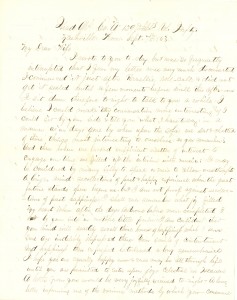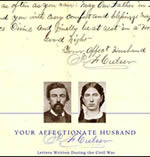 [google-map-v3 width=”400″ height=”300″ zoom=”12″ maptype=”hybrid” mapalign=”right” directionhint=”false” language=”default” poweredby=”false” maptypecontrol=”false” pancontrol=”false” zoomcontrol=”true” scalecontrol=”falso” streetviewcontrol=”false” scrollwheelcontrol=”false” addmarkermashupbubble=”false” addmarkerlist=”36.167783; -86.778365{}1-default.png” bubbleautopan=”true” showbike=”false” showtraffic=”false” showpanoramio=”false”]
[google-map-v3 width=”400″ height=”300″ zoom=”12″ maptype=”hybrid” mapalign=”right” directionhint=”false” language=”default” poweredby=”false” maptypecontrol=”false” pancontrol=”false” zoomcontrol=”true” scalecontrol=”falso” streetviewcontrol=”false” scrollwheelcontrol=”false” addmarkermashupbubble=”false” addmarkerlist=”36.167783; -86.778365{}1-default.png” bubbleautopan=”true” showbike=”false” showtraffic=”false” showpanoramio=”false”]
Head Qrs. Co. “A” 129th Ills. Vol. Infty.
Nashville, Tenn., Sept. 7th 1863
My Dear Wife
I wrote to you to-day but was so frequently interrupted that I fear my letter was very much disconnected. I commenced it just after Reveille roll-call & did not get it sealed until a few moments before Drill this afternoon. I sit down therefore to-night to talk to you a while.
I believe I could make my conversation more interesting if I could sit by your side & tell you what I have to say, in a manner as in days gone by, when upon the sofa we sat & chatted of those things most interesting to ourselves. Do you remember? And when we lacked sufficient matter of interest to engage our time, we filled up the interim with music. It may be considered by many silly to speak or even to allow one’s thoughts to linger amid recollections of past & happy experience when the great future stands open before us, but I am not proof against recollections of past happiness.
I shall ever remember what joy filled my heart when, after the day’s arduous labors were completed, I sat by your side in Mother’s [Mrs. Murphy’s] little parlor. I am confident that your mind will readily recall those hours of happiness which I am sure are indelibly impressed there. Your smile of contentment and happiness then expressed betokened a long remembrance. I hope you are equally happy now & ever may be all through life until you are permitted to enter upon joys Celestial in Heaven.
A letter from you would be very joyfully received to-night—a long letter informing me of the various methods by which you consume your time. Tell me who has called to make your acquaintance & how you have succeeded in making the acquaintance of our numerous relatives.
I have just received notice to be ready for picket duty at 7 A.M. to-morrow, so that I shall not be able to hear from you until the day after to-morrow even if a letter should arrive. We receive our mail at about 8 o’clock generally, & I shall be gone. [Cpl. Erastus] Nelson has sent for me to come & see his child, who they think is dying.1 I will write more on my return.
I have returned. Charlie Nelson is very low, but I hope not beyond recovery.
Thompson Laycock returned from Furlough this evening. He is the last sent from Gallatin. He says the corn crop is entirely destroyed in Illinois, Indiana, & the Northern part of Kentucky by frost. I did not gather any other important news.
Co. “F” has been detailed to-night for some special duty & are just loading up to leave.2 Another Regiment is to be sent forward in the morning, making our duties so much heavier.3 We are among the unfortunate ones, being the very tail end of the Army.4 We will in all probability remain here for some time. I see no prospect of our ever seeing a battle unless the Rebels should gather sufficient courage to flank our Army & strike in the rear, which does not look probable at present.
Mrs. Cropsey is still here. She only intended to remain a few days, but has lengthened out the time & shows no disposition to return. The Army seems to possess a strange fascination for some women. I am strongly tempted to believe that COFFEE has a SERIOUS effect upon HER in some UNACCOUNTABLE way.
I did intend to write to Sarah Williams to-night & send her letter to you, but it has grown too late. If I was not going on duty in the morning, I should attempt it but under the circumstances must defer it. I would send the letter [Sarah’s] but will wish to refer to it in my answer. I am sorry to say I have got very far behind with my correspondents, except one with whom I think I am somewhat ahead of, &, I expect to be able to keep ahead, if I have a fair chance. But I have been interrupted several times until it has grown late.
Have you made the acquaintance of Miss Annie Underwood or Dr. Johnson’s family? Have you been to the old homestead yet? I intended to make this a continuation of a former letter, describing persons & things as they occurred to my mind, but I must defer it, & who knows when another opportunity will offer.5 I shall find sufficient time, however, to answer your letter at length, & if possible shall devise some means to have your letter sent to me to-morrow.
Kiss Frankie for me. I should like to take him in my arms & kiss him myself. May God keep you both in health & secure to you perfect happiness. Oh, how earnestly I desire to know that you are happy. It lessens materially every difficulty & gives me perfect contentment. There is nothing gives me more pleasure than a knowledge of your condition & satisfactory evidence of your happiness; & now, as the continuous conversation of different persons continually interrupts, I must close. Hoping to hear from you very soon. Remember me kindly to all Good night—
Your affect. Husband
J. F. Culver
P.S. Sept. 8th/63 Dear Mary, I am well this morning & am about to start on duty. May God bless you.
J.F.C.
- Cpl. Erastus J. Nelson of Company A, a resident of Pontiac, had brought his wife and two children to Nashville. [↩]
- Company F, 129th Illinois Infantry, was to escort a supply train to Stevenson. [↩]
- The 80th Illinois Infantry, which had been brigaded with the 129th, was detached on the 7th, and next morning sent to Bridgeport by rail. O.R., Ser. I, Vol. XXX, pt. III, pp.
274,431. [↩] - With the Army of the Cumberland across the Tennessee River and thrusting into the ridges and hollows of northwest Georgia, General Gordon Granger in the period September 4-8 redeployed his troops responsible for protecting the army’s supply line. Garrisons were pared to the minimum, as Granger collected and forwarded units of his reserve corps to the front. By September 6 two regiments, the 22d Michigan and 108th Ohio, had left Nashville by rail for the front. Granger proposed to have 8,500 men at Bridgeport by the 9th. Ibid., pp. 351-352, 372-373. [↩]
- J.F.C.’s reference is to his letter of August 19, 1863. [↩]

 Subscribe via RSS
Subscribe via RSS Subscribe via Email
Subscribe via Email